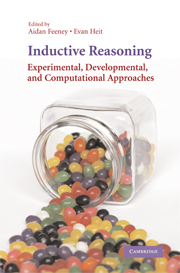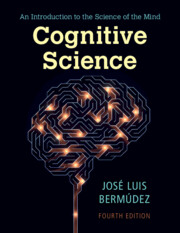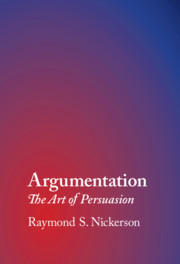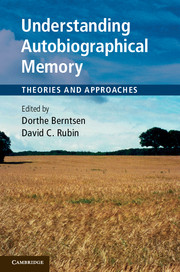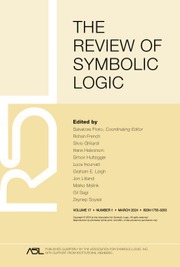Inductive Reasoning
Experimental, Developmental, and Computational Approaches
- Editors:
- Aidan Feeney, University of Durham
- Evan Heit, University of California, Merced
- Date Published: November 2007
- availability: Available
- format: Paperback
- isbn: 9780521672443
Paperback
Other available formats:
Hardback, eBook
Looking for an inspection copy?
This title is not currently available on inspection
-
Without inductive reasoning, we couldn't generalize from one instance to another, derive scientific hypotheses, or predict that the sun will rise again tomorrow morning. Despite the widespread nature of inductive reasoning, books on this topic are rare. Indeed, this is the first book on the psychology of inductive reasoning in twenty years. The chapters survey recent advances in the study of inductive reasoning and address questions about how it develops, the role of knowledge in induction, how best to model people's reasoning, and how induction relates to other forms of thinking. Written by experts in philosophy, developmental science, cognitive psychology, and computational modeling, the contributions here will be of interest to a general cognitive science audience as well as to those with a more specialized interest in the study of thinking.
Read more- Includes articles from leading researchers in this area
- Crosses over to other areas such as deductive reasoning, decision making, computational modeling
- Includes an integrative concluding chapter
Customer reviews
Not yet reviewed
Be the first to review
Review was not posted due to profanity
×Product details
- Date Published: November 2007
- format: Paperback
- isbn: 9780521672443
- length: 376 pages
- dimensions: 257 x 151 x 22 mm
- weight: 0.504kg
- availability: Available
Table of Contents
Preface Aidan Feeney and Evan Heit
1. What is induction and why study it? Evan Heit
2. The development of inductive reasoning Brett K. Hayes
3. Interpreting asymmetries of projection in children's inductive reasoning Douglas Medin and Sandra Waxman
4. Property generalization as causal reasoning Bob Rehder
5. Availability in category-based induction Patrick Shafto, John Coley and Anna Vitkin
6. From similarity to chance Sergey Blok, Daniel Osherson and Douglas Medin
7. Theory-based Bayesian models of inductive reasoning Joshua Tenenbaum, Charles Spence and Patrick Shafto
8. Use of single or multiple categories in category-based induction Gregory Murphy and Brian Ross
9. Abductive inference: From philosophical analysis to neutral mechanisms Paul Thagard
10. Mathematical induction and induction in mathematics Lance Rips and Jennifer Asmuth
11. Induction, deduction, and argument strength in human reasoning and argumentation Mike Oaksford and Ulrike Hahn
12. Individual differences, dual processes, and induction Aidan Feeney
13. Taxonomising induction Steve Sloman.
Sorry, this resource is locked
Please register or sign in to request access. If you are having problems accessing these resources please email [email protected]
Register Sign in» Proceed
You are now leaving the Cambridge University Press website. Your eBook purchase and download will be completed by our partner www.ebooks.com. Please see the permission section of the www.ebooks.com catalogue page for details of the print & copy limits on our eBooks.
Continue ×Are you sure you want to delete your account?
This cannot be undone.
Thank you for your feedback which will help us improve our service.
If you requested a response, we will make sure to get back to you shortly.
×
